AlumNotes: Catalyst Summer 2020
Story
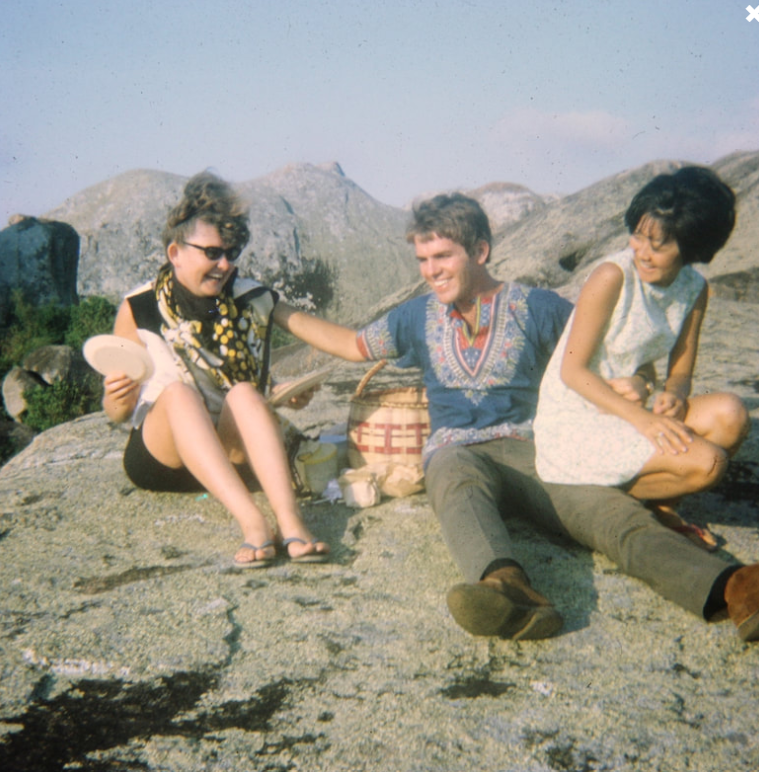
Lois Chetelat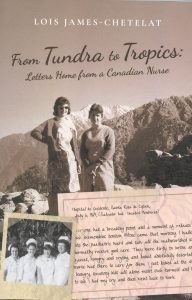
India 1963-65
Lois draws on the letters she wrote home regularly during her time away and discusses the historical events, economic conditions and social values that affected her life and those of other women in her book, From Tundra to Tropics: Letters Home from a Canadian Nurse.
Lois graduated as a nurse in 1961 and spent two years in the Canadian Arctic before being one of the first Cuso volunteers placed in India in 1963 to provide care for refugee Tibetan children. She went on to volunteer assignments in Honduras and Indonesia, met her husband, had two sons and graduated with a PhD in Anthropology from Carleton University.
Marian White
Nigeria 1977-78; Board member 2005-08; Guyana 2016-17
I recently celebrated my 65th birthday. Facebook hooked me in to attaching a fundraiser to it. I got sucked in and named Cuso International as my organization of choice. I named $650 as my target. First, I put $65 then I added the zero! Editor’s note: Thank you, Marian, for raising $670 for Cuso!
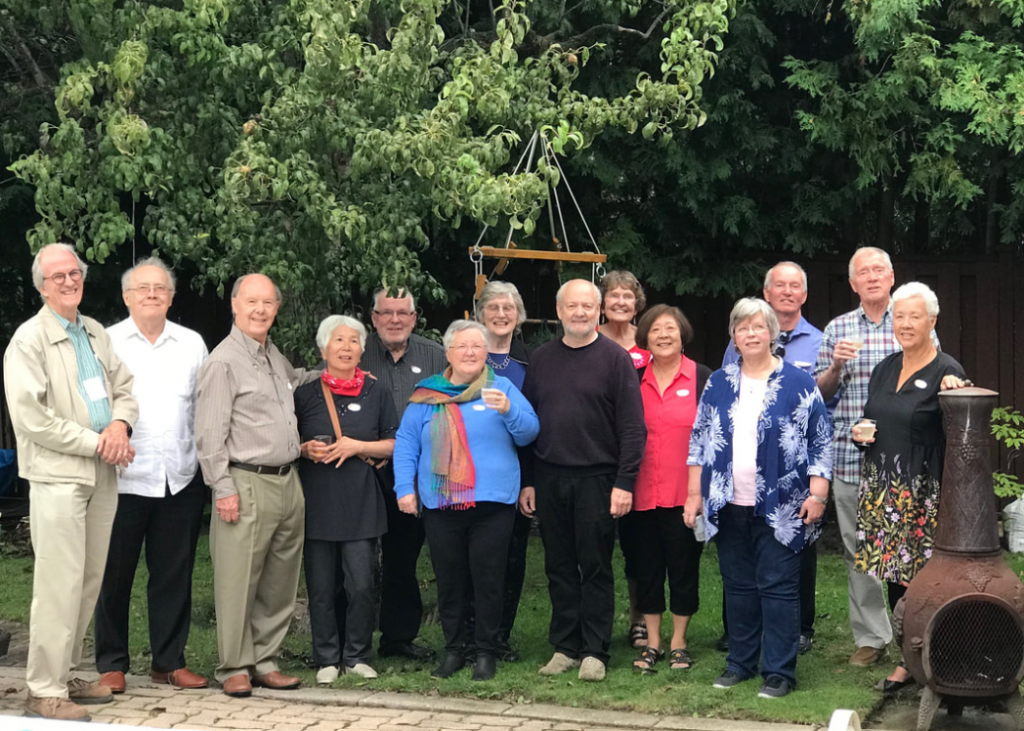
Sharon Channer
Tanzania 1969-71
It has been 50 years since an idealistic and committed group of Canadians boarded an airplane and flew off to Tanzania with Cuso. We were full of excitement, anticipation and maybe a touch of apprehension. Most of us had freshly minted degrees, diplomas or certificates and were eager to apply what we had learned. Our departure was preceded by a three-week orientation, which included cross-cultural and Kiswahili language training. We then jetted off to Dar es Salaam, with stops in London and Nairobi. For some of us, this was our first experience flying. In “Dar” we were housed at the Salvation Army hostel and gradually dispersed to our respective new homes for our two-year assignments.
Fifty years later, there is probably one thing on which we can all agree—namely that our experiences in Tanzania were memorable. And for a few of us, the transformation was profound. This was made abundantly clear at a Cuso Tanzania 1969 reunion party held in Toronto in September 2019. The party was a resounding success. Returned volunteers arrived from Victoria, Vancouver, Melfort, New York, Montreal, and from various locations in Ontario.
Comments from various guests provide a summary of the great event:
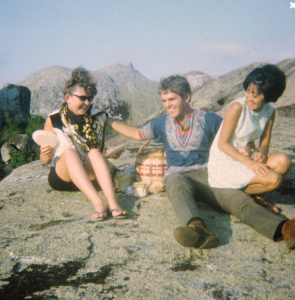
“The food was delicious, and the location was perfect. It was such an amazing afternoon and evening. What an interesting group it was! As everyone seemed to say, our years in Tanzania changed all of our lives in so many ways.”
“I’ve been to a couple of reunions in the past but this one was outstanding—so well organized and the atmosphere/ambiance was of a nature that one just doesn’t experience often in life.”
“Revisiting the past is not so bad when the people have remained so active, intense about issues and positive in outlook.”
“It was quite an experience to relive memories of 50 years ago and learn how much is still very fresh in our minds. Congratulations to all for such interesting lives and careers since 1969. It appears that none of us has ever recovered from wanderlust.”
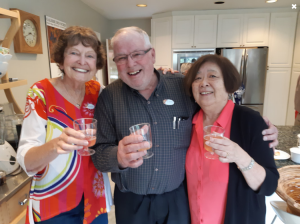
“The Tanzania experience at such a formative time in the history of that country and at such an impressionable time in our lives, very much shaped our attitudes and aspirations in subsequent years.”
“Our Tanzania experience seems to have affected all of our lives in many positive ways. Perhaps we should try to get together again before another 50 years pass.”
As the celebration cake said, “And just like that…1969 was 50 years ago!”
Alan Dill
Malawi 1972-74; Ghana 1977-79
In response to Tim Babcock’s note in the Fall 2019 edition of Catalyst, I wanted to share my experience in re-establishing contact with my former colleague and housemate Charles Gunsaru, a Malawian science teacher.
Charles and I shared a house at Chikwawa Secondary School in southern Malawi during my first stint with Cuso. We worked closely together in the mathematics and science department of the school. Charles guided me through the ins and outs of teaching in Malawi, while I brought a different perspective based on my Canadian university background. We had a very good working and personal relationship.
After leaving Malawi in 1974, I remained in touch with Charles for a year or so. That was back in the days of what we now call “snail mail,” which was the only viable option at the time. Eventually the letters stopped coming and I lost touch for about 30 years.
Then, in the mid-2000s, I got an email from Cuso, saying that someone was trying to get hold of me. It turned out to be Charles, who had been in Halifax for an international educational conference. He was able to get in touch with Cuso, who in turn got in touch with me. I responded to his email and spoke to him by telephone.
Charles and I have remained in touch (mainly by email) ever since. While there is much to criticize about the internet, one very good thing is that it allows people to find each other after decades apart. At the time he first contacted me, Charles held the top civil service position in the Malawi Ministry of Education, second only to the Minister. He has since retired.
While I have not been able to travel to Malawi, I am grateful to remain in touch with Charles, who has kept me up to date with what is happening in Malawi.
Neill McKee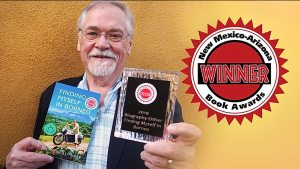
Malaysia 1968-70
Readers’ Favorite Book Reviews and Award Contest recognized Finding Myself in Borneo with an honorable mention in the Non-Fiction-Travel category. The contest features thousands of contestants from over a dozen countries, ranging from new independent authors to NYT best-sellers and celebrities.
My memoir also won the award for Biography-Other in the 13th Annual New Mexico/Arizona Book Awards. The contest this year had a total of 1,545 entries with many in the Biography category, which includes autobiography and memoir. There were 10 finalists in Biography.
For those who like to listen, an audio-book version is available. Visit neillmckeeauthor.com/audiobook for retail outlets.
I am pleased to donate my earnings from all in-store sales and orders, plus all online sales in Canada, to Cuso, the organization that got me started in my 45-year international career and put me in a place that generated so many entertaining stories! Editor’s note: Thank you, Neill, for giving back to Cuso!
Bob Jamieson
Ghana 1970-72
After seeing the article on Stan Bunston in the last issue, I thought I should send you my story. Keep up the good work.
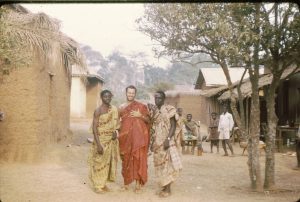 Spotlight
Spotlight
Bob Jamieson worked as a Cuso volunteer in the Ghana Department of Game and Wildlife from 1970 to 1972. He was part of a program with volunteers working on conservation projects across Africa in that era. He ran a crew called the Faunal Survey Team that did surveys across Ghana dealing with wildlife issues such as elephant raiding of farms and looked at sites for new national parks. In the late 1970s, his work helped in the creation of the national park system in Ghana that we see today.
Back home he led a varied career as an outdoor writer, ecologist, rancher and conservationist. In the 1980s he returned to Ghana, during very tough times economically and politically, to do a story on conservation for an international conservation magazine. He learned much later that his willingness to go back and see old friends there during those tough times was very important them.
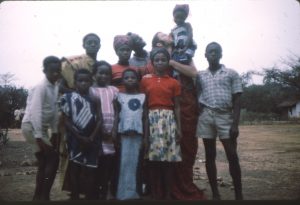 Ghana recovered in the early 1990s. Bob and his sisters began to run eco-tours to Ghana to show visitors both the wildlife and the culture of Ghana. They were the pioneers in this area for Ghana, a sector that is now an important part of tourism in the country.
Ghana recovered in the early 1990s. Bob and his sisters began to run eco-tours to Ghana to show visitors both the wildlife and the culture of Ghana. They were the pioneers in this area for Ghana, a sector that is now an important part of tourism in the country.
In 2001 while visiting old friends in Wa, a city in northern Ghana, Bob was made a chief, the “M’Gulyaa Naa”, or chief of friendship among the Wala people who live along the north and west borders of Mole National Park. His two sisters were given titles as Queen Mothers. His chieftaincy was recognized by other tribes living in the area around the park.
“My time in Ghana utterly changed my life,” says Bob. “I worked in the villages outside of the then-few national parks and got to know the rural people of Ghana. They are wonderful people who gave me a different perspective on what is important in life. The people I worked with in the department are some of the most committed conservationists on the planet. They kept the department going and maintained the parks through the 1980s when they often went for eight months without being paid.
“Ghana now has a solid system of national parks and reserves as a result, along with many village-based eco-tourism sites that were among the first such sites established in Africa. I feel honored to have known these people, like Dr. Emmanual Asibey, Val Sackey, Gerry Punguse, Ahmed and Vivian Nuhu, John Mason and many others who are my personal heroes.”
Back home, Bob has played a variety of roles as an ecologist on a variety of federal and provincial boards, as a member of the BC Round Table on Environment and Economy, and, most recently, as a board member with the Canadian Agri-Food Policy Institute. He has also acted as a strategic advisor to First Nations on tourism and resource issues. He presently is focused on climate issues and the shift to climate friendly energy sources. Bob now lives on a ranch in southeast BC near a village called Ta Ta Creek, where all Cuso folks are welcome, if you can find it. Connect through email: bjamieson@cintek.com.
Hans-Henning Mündel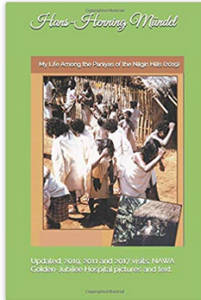
India 1966-69
An update of my 2007 book, My Life Among the Paniyas of the Nilgiri Hills, is now available via Amazon and Kindle as paperback and e-book. The 2019 update includes all pictures in colour and the fundraising result of a hospital for the Paniyas and others in southern India.
Marcel Zollinger
Botswana 1974-77
As a young man, Marcel Zollinger arrived in Canada from Zurich, Switzerland during our centennial year 1967 and completed his Bachelor of Science in Agriculture at McGill University. He saw his future helping newly independent developing countries become self-sufficient. It was a decision that would take him around the world.
With that new degree in agrology, the science of soils and the production of crops, Marcel accepted a Cuso assignment in rural Botswana. He, his wife and two boys travelled by ship from England to Cape Town, South Africa. From there he drove a mechanically challenged car to Tutume, Botswana where he taught school.
“I was fortunate to teach a class of senior students, and they achieved a first in Botswana, passing the Cambridge Certificate in Agriculture—all of them,” he states proudly. And the school vegetable garden he and his students set up is still operational, selling produce, chickens and eggs to support the educational facility.
That experience in the southern hemisphere convinced Marcel he needed more specialized training in economic development, so he completed a Master of Science in Tropical Development in Reading, England. Just then Cuso International needed an agricultural planner as part of its team working with the Provincial Government in Manus Island, Papua New Guinea. This assignment too was extended into four years during which the Zollinger family increased by two girls.
Marcel returned to Canada in 1984, making Ottawa his home. “Now it was time to translate my experience and education into a job with the federal government,” he explains. “There was a great demand for independent consultants. For the next 15 years, I moved from contract to contract for CIDA, IDRC, Foreign Affairs (now Global Affairs) and several NGOs, including Cuso.”
In those days project evaluation was the trendy management technique, and his assignments totaled some 40 development projects in over 30 countries. But with federal budgetary reductions in overseas spending in his area of expertise, Marcel retired in 2000. Not comfortable doing nothing, he remains active with his family and his hobbies.
In July 2019, Marcel and his wife Connie attended the CUSOBOT Reunion in Ottawa. Over 130 people attended to reminisce and renew old friendships. As he just turned 75, he admits to slowing down rather than speeding up but gets a lot of satisfaction looking back on his adventurous international life.
Anne Saunders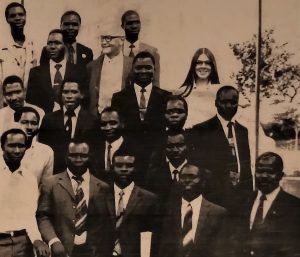
Malawi 1974-76
In January 2019 I was hired to research Canadians’ involvement in the Biafran War. A young Nigerian broadcaster, wife and mother, Angela Onuora, living in Waterloo, Ontario, made connections between the Biafran War, her family’s history, and the role of Canadians. Compelled by the story of Canairelief, Ms. Onuora is making the documentary Operation Lights Out: The Story of Canairelief.
The research led me to learn about the Cuso program in Nigeria from 1962 through 1969. The best known Cuso Nigeria volunteer during the Biafran War was perhaps Diane North, who was featured in Maclean’s magazine in February 1969. Diane was a Cuso nurse in Nigeria from 1964 to 1966. I found it so interesting reading about the development of the Nigeria program in the 1960s and its continuance through the Biafran War. Thanks to Cuso International for its permission to research Cuso files at the Library and Archives Canada in Ottawa.
Christopher Braeuel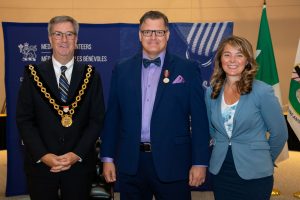
Tanzania 2013-14
I was recently awarded the Governor General’s Sovereign’s Medal for Volunteers (SMV). Among the nation’s key honors, the SMV is awarded to select Canadians who have made significant, sustained and unpaid contributions to their community in Canada or abroad. It’s the highest volunteer honour in Canada. The medal was presented by Ottawa Mayor Jim Watson and Kanata North Councillor Jenna Sudds on behalf of the Governor General.